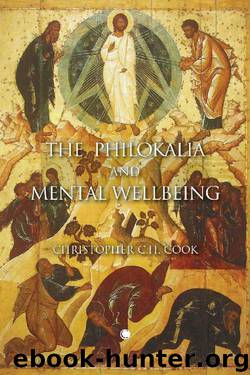Philokalia and the Inner Life: On Passions and Prayer by Cook Christopher

Author:Cook, Christopher [Cook, Christopher]
Language: eng
Format: epub, mobi
Tags: the Passions, Mental Well-Being, Constituent Works of the Greek Philokalia, remedies for the Passions, Psychotherapy, On Thoughts and Prayer, Authors of the Works included in the Greek Philokalia, Greek Philokali
Publisher: James Clarke & Co
Published: 2011-01-27T17:00:00+00:00
a state of inner tranquillity or mental quietude and concentration which arises in conjunction with, and is deepened by, the practice of pure prayer and the guarding of heart (q.v.) and intellect (q.v.). Not simply silence, but an attitude of listening to God and of openness towards Him.143
In their introduction,144 they also note that the word bears a sense of being “seated” or “fixed”. This meaning is reflected in the sense of mental “concentration” that they include in their definition. However, they also note that the spiritual path of hesychasm cannot be followed in a vacuum. It is anchored in the doctrine, ecclesiology, soteriology, sacramental and liturgical life of the Eastern Church, and also (although not exclusively) within a monastic tradition located within the wider life of that church. Hesychia also involves a bodily dimension, as well as being a state of mind, the inner tranquillity being mirrored by an outer state of withdrawal from the world.145
How is this term, hesychia, used in the pages of the Philokalia?
Firstly, this term is used extremely widely in the Philokalia. In fact, it is employed by every author of the Philokalia,146 except the author(s) of the text attributed to Antony the Great, the author of the text attributed to Theognostos, Theophanis, and Symeon the Studite (in a text attributed to Symeon the New Theologian).
Secondly, although it is in the nature of these things that there can be no surveys or statistics to quantify the matter, hesychia is a state which is almost certainly attained by very few people.147
Thirdly, hesychia is closely related to a number of other subjects of importance. For example it is related to the practice of theology (in the strict hesychastic sense of participation in divine realities and prayer), which presupposes attainment of hesychia. It also overlaps with the practice of watchfulness.148
Fourthly, hesychia is achieved by a variety of means, variously described by different authors of the Philokalia. These include: watchfulness,149 detachment,150 obedience,151 courage,152 inner grief, patience and humility,153 attentive waiting on God,154 prayer,155 and psalmody.156
Fifthly, hesychia frees the intellect from impure thoughts,157 destroys hidden passions,158 and removes “impassioned craving” from the soul.159
Sixthly, hesychia opens the intellect to divine knowledge,160 is full of wisdom and benediction,161 brings about fear and love of God,162 is the pathway to heaven,163 initiates the soul’s purification,164 is associated with dispassion,165 leads towards perfection,166 and gives birth to an “unceasing aspiration towards [God]”,167 to contemplation,168 and to prayer.169
It may be helpful to examine a few passages a little more closely.
Peter of Damaskos, who includes hesychia as the first of his list of seven forms of bodily discipline, understands it as:
Download
Philokalia and the Inner Life: On Passions and Prayer by Cook Christopher.mobi
This site does not store any files on its server. We only index and link to content provided by other sites. Please contact the content providers to delete copyright contents if any and email us, we'll remove relevant links or contents immediately.
The Gnostic Gospels by Pagels Elaine(2527)
Jesus by Paul Johnson(2352)
Devil, The by Almond Philip C(2324)
The Nativity by Geza Vermes(2226)
The Psychedelic Gospels: The Secret History of Hallucinogens in Christianity by Jerry B. Brown(2149)
Forensics by Val McDermid(2088)
Going Clear: Scientology, Hollywood, and the Prison of Belief by Lawrence Wright(1977)
Going Clear by Lawrence Wright(1962)
Barking to the Choir by Gregory Boyle(1819)
Old Testament History by John H. Sailhamer(1809)
Augustine: Conversions to Confessions by Robin Lane Fox(1769)
The Early Centuries - Byzantium 01 by John Julius Norwich(1736)
A History of the Franks by Gregory of Tours(1720)
A Prophet with Honor by William C. Martin(1717)
Dark Mysteries of the Vatican by H. Paul Jeffers(1707)
The Bible Doesn't Say That by Dr. Joel M. Hoffman(1676)
by Christianity & Islam(1627)
The First Crusade by Thomas Asbridge(1601)
The Amish by Steven M. Nolt(1563)
